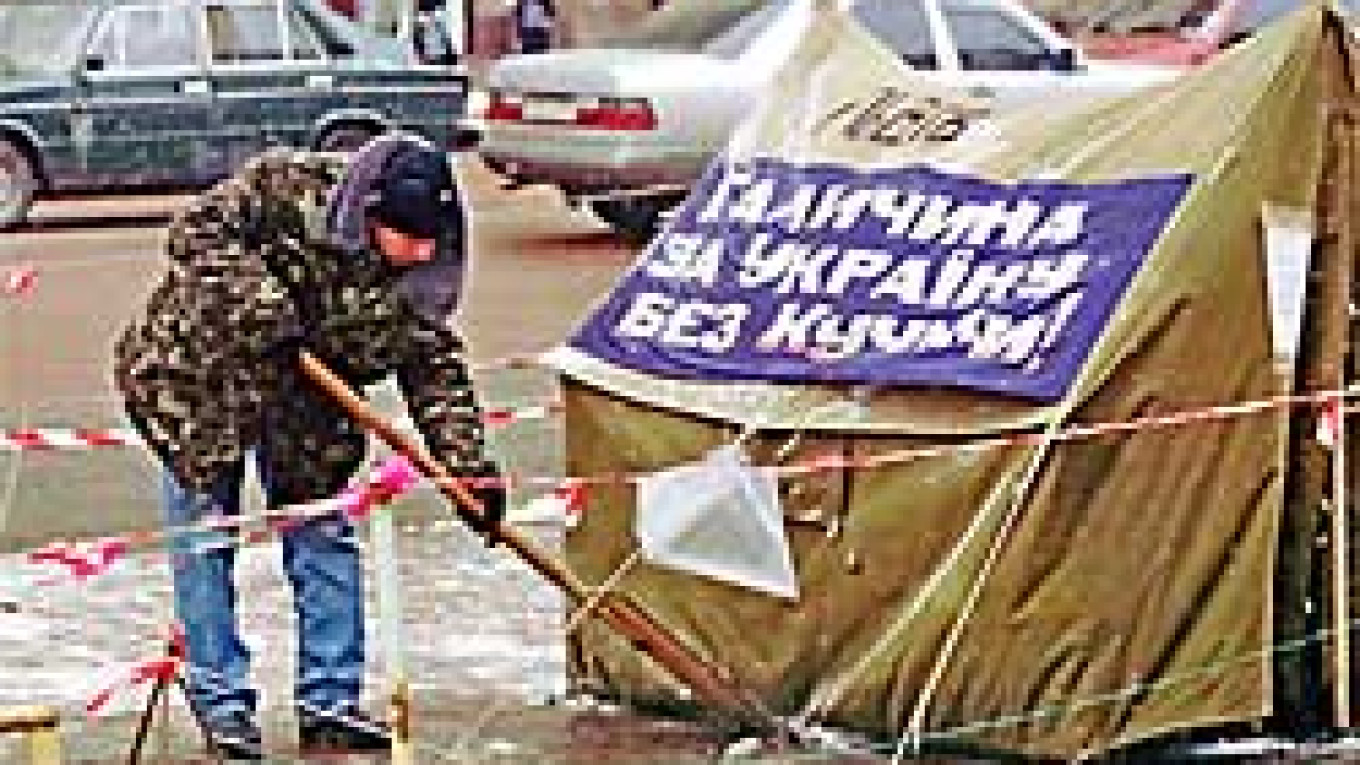Two months later, battered by bone-chilling winds, sub-zero temperatures and sporadic harassment, the single tent has mushroomed into a full-blown camp, a potent symbol of resistance to scandal-beset President Leonid Kuchma.
More than 100 people are now camping along the city's main street, Khreshchatyk, demanding that Kuchma quit over allegations that he plotted the disappearance of a journalist.
"I've been here since Feb. 5, and it was a tough slog through heavy snow and fog," said Viktor, a 60-year-old welder who trudged 350 kilometers with others from the town of Dnipropetrovsk in central Ukraine.
"But we have warm clothes, and I am here because I do not think Kuchma is a good president for our country. I wish my grandchildren could trust the government and read the truth in the newspapers," he said.
Ukraine has been rocked by the case of Georgy Gongadze, a journalist critical of Kuchma who went missing more than four months ago.
A headless corpse that friends and relatives believe to be his was found in November. Opposition politicians have published tapes on which a voice similar to Kuchma's is heard giving orders to "deal with" Gongadze.
Kuchma denies all involvement in the case and has warned that the furor threatens Ukraine with collapse.
But that has not prevented thousands of Ukrainians from taking to the streets of Kiev this month to call for his resignation and a full investigation of the Gongadze case.
The ramshackle encampment, incongruous among the stone facades and broad boulevard of Khreshchatyk, is the epicenter of the protests.
"Kuchma out!" "Don't let them kill your family and children!" "No to the criminal regime!" read the slogans in the tent city, which, nestling under communist and nationalist flags, is a rare example of political harmony.
Many of the tent people have traveled hundreds of kilometers across Ukraine to camp in the heart of the capital. Despite the hardships, they have vowed to stay until their demands are met.
Each group of protesters sets up a new tent in the camp, which is extending along the main street. There are now 36 tents spread along a 100-meter strip under the neon glare of upmarket boutiques, a subway station and a McDonald's restaurant, all under the gaze of police officers.
The first tents went up in December on the Square of Independence, but following a court ruling the protesters had to clear out for the Christmas and New Year holidays.
They decided to move their protests away from Kiev, setting up camp in several regional cities. But the tents were quietly and swiftly destroyed by local authorities.
Shortly after the holidays the tent city returned to Kiev, but the protesters had to move from the main square, which was fenced off and closed for reconstruction.
The protesters are under pressure from authorities. A local court ruled that the tents should be cleared away because they hampered pedestrians, access to the subway and were an eyesore.
Bailiffs have visited the tent city several times but refrained from taking major action. The protesters say they will appeal the court ruling and defend their camp peacefully.
"We are ready for any provocations," said Volodymyr Chemeris, coordinator of the "Ukraine Without Kuchma" movement, which has united political parties and human rights groups in protests against the president.
The protesters say true grit is helping them survive freezing temperatures. Several dozen spend the night in the tents, sheltered from icy winds by only a thin sheet of canvas.
They stay to guard the camp, fearing the authorities might destroy it overnight or that beggars will steal their possessions.
"It is very difficult here at night, very cold and noisy because of cars driving by," said Volodymyr Sirenko, 29, who helps organize the daily routine for the tent dwellers.
The protesters survive on donations and money from selling opposition newspapers. Many stay with friends and relatives at night or rely on the support of citizens living nearby, some of whom bring hot meals and let the protesters sleep and shower in their homes.
"People bring us food and tea in big saucepans, and we buy disposable dishes and cups," Sirenko said, pointing to a dozen people quietly lining up for hot soup.
He said the protesters were distributing leaflets and trying to convince often-skeptical Kiev citizens to join the rallies. Their work was bringing results ?€” but very slowly.
"More and more people come to support us, even the quite wealthy come here and bring us warm clothes," Sirenko said.
Sirenko said the tent city was open to everyone. But getting past the dour young guards in khaki uniforms and black masks is far from simple. Preserving order is a top priority.
"It is a real challenge, especially at night when there are many drunkards, and they may provoke disturbances," Sirenko said. "But it is important not to give the authorities any reason to clear the camp away."
A Message from The Moscow Times:
Dear readers,
We are facing unprecedented challenges. Russia's Prosecutor General's Office has designated The Moscow Times as an "undesirable" organization, criminalizing our work and putting our staff at risk of prosecution. This follows our earlier unjust labeling as a "foreign agent."
These actions are direct attempts to silence independent journalism in Russia. The authorities claim our work "discredits the decisions of the Russian leadership." We see things differently: we strive to provide accurate, unbiased reporting on Russia.
We, the journalists of The Moscow Times, refuse to be silenced. But to continue our work, we need your help.
Your support, no matter how small, makes a world of difference. If you can, please support us monthly starting from just $2. It's quick to set up, and every contribution makes a significant impact.
By supporting The Moscow Times, you're defending open, independent journalism in the face of repression. Thank you for standing with us.
Remind me later.


